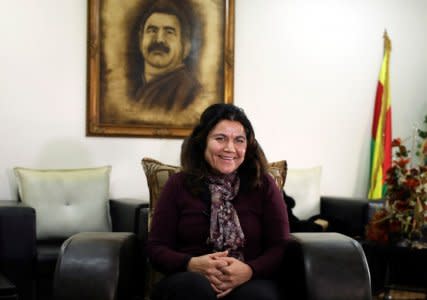Syrian Kurdish leader hopes new force will counter threats from Turkey, Damascus

Thomson Reuters
By Rodi Said
QAMISHLI, Syria (Reuters) - Kurdish-led regions of Syria are looking to a new U.S.-backed border force to protect them in the face of growing threats from Turkey and Damascus, a senior Kurdish politician told Reuters.
With a political solution to Syria's nearly seven-year-old war still out of reach, the risks for the country's Kurds and their Arab allies remain high, Fawza Youssef said.
The U.S.-led coalition that has been fighting Islamic State in Syria since 2014 is building a new 30,000-strong border force with its Syrian militia allies in the north.
The move has been sharply opposed by Ankara, already angry at U.S. support for Kurdish forces in Syria, which it sees as an extension of Kurdish insurgents in southeastern Turkey.
The Syrian Kurdish YPG spearheads an alliance of militias which has battled Islamic State in northern and eastern Syria under the banner of the Syrian Democratic Forces (SDF).
With its inaugural class currently in training, the new force will guard the borders of SDF territory.
It will deploy along the frontier with Turkey to the north and the Iraqi border to the southeast. The force will also stand guard along the Euphrates River Valley facing the Syrian military, which is supported by Russian air power and Iranian-backed militias.
"There are threats from the Turkish state. The regime also more than once declared (it would) attack," said Youssef.
"To prevent any attack ... there must be a deterrent force that protects the border between our areas and the others," she added. "And we must protect the gains we have liberated."
Since the conflict began in 2011, the YPG and its allies have set up autonomous cantons in the north. Their sphere of influence expanded after they joined forces with the United States to fight Islamic State.
With Islamic State near collapse, Syrian Kurds have been working to entrench their authority in the north.
The Syrian government has mostly avoided clashing with Kurdish fighters, but its rhetoric has grown hostile. While Kurdish leaders seek negotiations, the Syrian government and its Iranian allies have pledged to capture the SDF's territory.
Damascus, which has accused the United States of illegal occupation and the SDF of treachery, vowed on Monday to end any U.S. presence in Syria.
LEFT OUT
With help from Russia and Iran, President Bashar al-Assad's military has regained much of Syria from rebels and from Islamic State. The YPG and its allies now control the largest area of Syria outside government control.
Even with the defeat of Islamic State, "it appears the area will not easily be stabilized," said Youssef, a senior member of the authority running the Kurdish-controlled autonomous cantons in northern Syria.
"Until a political settlement is reached in Syria, these areas need protection. Now, there aren't any guarantees," she said.
"These forces are Syrian and will protect Syrian land from aggressors," she said of the new border force, which will operate under SDF command.
The United States says it has about 2,000 troops in Syria in the battle against Islamic State. Washington has said it is ready to stay in the country until it is certain of Islamic State's defeat, and until there is meaningful progress in failed U.N.-sponsored peace talks on ending the conflict.
Youssef said delegates from the U.S. State Department, whom she met in northern Syria last week, made it clear that U.S. forces would not leave before a political settlement.
The American officials also said all of Syria's parties must take part in the diplomatic process, she said. Syrian Kurds have been left out of international peace talks for years, in line with Turkish wishes.
On Monday, Turkish President Tayyip Erdogan said the United States was trying to create a "terror army" and pledged to crush the new force before it came into existence.
U.S. support for the YPG has put enormous strain on ties with NATO ally Turkey, which views growing Syrian Kurdish power as a threat to its national security. Ankara considers the YPG an extension of the outlawed Kurdistan Workers' Party, which has waged a three-decade insurgency inside Turkey.
Youssef said U.S. military support would reinforce security in Kurdish-held territory, avert bombings, and prevent Islamic State from reinventing itself.
"Daesh may be weakened militarily, but this does not mean it will completely end," she said, referring to Islamic State.
(Reporting by Rodi Said; Writing by Ellen Francis in Beirut; Editing by Giles Elgood)
See Also:

 Yahoo News
Yahoo News 
